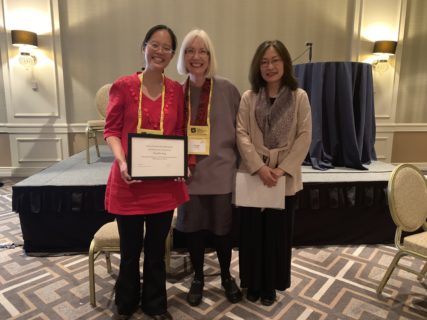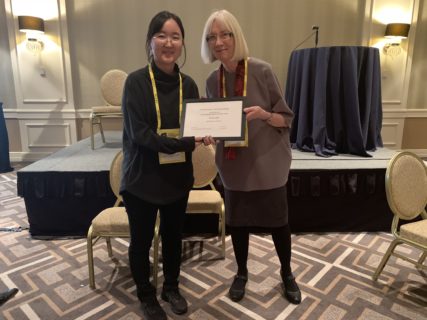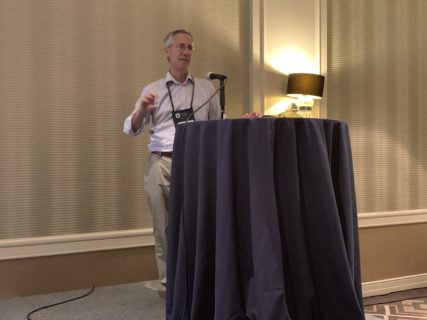Article begins
The SEAA section hosted a diverse range of activities, presentations, and events at the 2018 Annual Meeting. Highlights: 25 panels (including four co-sponsored invited sessions); a Business Meeting, featuring a special speaker; and a lunch-time mentoring workshop on “Teaching East Asian Anthropology.”
SEAA panels
The SEAA program consisted of 25 panels, including invited sessions, volunteered sessions, and sessions built from individual papers, and posters. Of these, 12 were sessions with papers featuring research on different regions of East Asia. The panels explored a range of topics including politics, affective labor, gender, activism, demographic transitions, popular culture, and intimacy.
This year, the section featured four invited sessions that were co-sponsored with other AAA sections:
- Queer Asia Ethnographies of Change in a Transnational World (with AQA–Association for Queer Anthropology)
- Indexing Indigeneity in Taiwan: Resistance and Adaptation in Taiwanese Visual Culture (with SVA—Society for Visual Anthropology)
- Cyberwars, Street Politics, and the Problem of Populism in Korea and Japan (with SUNTA—Society for Urban, National and Transnational/Global Anthropology)
- Urban Futures and Expropriated Natures II: Rearticulating Relationalities of Scale (with SUNTA)
Business Meeting
SEAA members gathered for the annual Business Meeting, where the Board reviewed this year’s section activities and announced this year’s prize recipients. Priscilla Song was awarded the Francis L.K. Hsu Book Prize for Biomedical Odysseys: Fetal Cell Experiments from Cyberspace to China. Graduate student Jieun Cho was recognized for her paper “Affordances of Care,” with honorable mentions for Bram Colijn’s “Pluriprax Households in Modern China: Contested Family Rituals in a Shifting Religious Landscape” and Tomonori Sugimoto’s “Refusing to Leave: The Indigenous Pangcah/Amis Politics of Claiming Land in Urban Taiwan.” One Day We Arrived in Japan (2017), directed by Aaron Litvin and Ana Paula Kojima Hirano, received the David Plath Media Award this year. An honorable mention was also given to Together Apart (2017), a film directed by Maren Wickwire.

Francis L.K. Hsu Book Prize winner Priscilla Song (left) with SEAA President Glenda Roberts (center) and incoming Secretary Satsuki Kawano (right). Jing Wang.

Graduate student Jieun Cho (left) was recognized for her paper “Affordances of Care” at the SEAA Business Meeting, pictured with SEAA President Glenda Roberts (right). Jing Wang.
Attendees also recognized outgoing SEAA Board Members Carolyn Stevens and Priscilla Song for their service to the section. Stevens completed her current term as Secretary, while Song served as Councilor and Program Chair. As this year’s Hsu winner, Song will chair the Francis L.K. Hsu Book Prize committee for the next year.

Jeffrey Wasserstrom speaks at the SEAA Business Meeting on “Reflections on writing and editing in the borderlands between disciplines and genres.” Jing Wang
SEAA welcomed Jeffrey Wasserstrom (University of California, Irvine) as special speaker. His talk, titled “Reflections on writing and editing in the borderlands between disciplines and genres,” drew on his insights from the field of history and his previous experience as editor of the Journal of Asian Studies. Wasserstrom called for a crossing of genres where academic writing would engage the public. In the latter part of his talk, he proposed several writing practices. He spoke about writing for a “one over” type of audience, such as those specializing in one discipline, one part of Asia, or one time period “over.” Furthermore, he noted the potential in story-telling, collaborative writing across disciplines, experimentation with writing forms different from the standard book-length monograph.
“Teaching East Asian Anthropology” lunch-time mentoring workshop
Following concerns about preparing for academic positions, this year’s SEAA lunch-time mentoring workshop centered on the theme of “Teaching East Asian Anthropology.” To cover a diversity of teaching contexts, including public universities, private universities, liberal arts colleges, and non-anthropology departments, the workshop organizers and student councilors Jing Wang and Yukun Zeng, invited four professors to serve as mentors: Satsuki Kawano, Nicholas Harkness, Jennifer Heung, and Gareth Fisher. Workshop attendees included 12 graduate students and two recent PhD graduates.
The faculty mentors spoke with attendees on topics such as designing syllabi, forming “teaching units,” preparing teaching materials according current student interests, curating East Asia in teaching, using East Asia as “theory-generator” in anthropological scholarship, and applying the critical conversation involving “#MeToo” in teaching
Our shared interests and experiences make this a welcoming little home within the larger AAAs. It’s easy to become consumed by my own research, so it’s great to connect with other folks casually over a margarita and explore what brings us all together as anthropologists.
Informal student dinner
For the past several years, SEAA’s student committee has been organizing a social gathering of students whose research interests fall under the broad category of East Asian anthropology. It offers an opportunity for graduate students to socialize with other young scholars from various institutions and to share research interests over food and drink. As one participant Adrienne Lagman commented,
Our shared interests and experiences make this a welcoming little home within the larger AAAs. It’s easy to become consumed by my own research, so it’s great to connect with other folks casually over a margarita and explore what brings us all together as anthropologists. I came away from the event appreciating not only being able to talk shop with engaging and insightful interlocutors, but getting to know my colleagues on a more personal level.
Heidi K. Lam is a contributing editor of the SEAA section column and a PhD candidate in anthropology at Yale University. She is writing her dissertation on the use of experience within the culture industry in Japan and its impact on tourism, the performing arts, and affective labor.
Shuang L. Frost is a contributing editor of the SEAA section column. She is a PhD candidate in social anthropology and STS at Harvard University. Her research interests include platform ethics, digital economy, social policy making, and urban studies.
Please contact Shuang Frost ([email protected]) and Heidi Lam ([email protected]) with your essay ideas and comments.
Cite as: Frost, Shuang L., and Heidi K. Lam. 2019. “SEAA Highlights at the 2018 AAA Annual Meeting.” Anthropology News website, January 4, 2019. DOI: 10.1111/AN.1249

